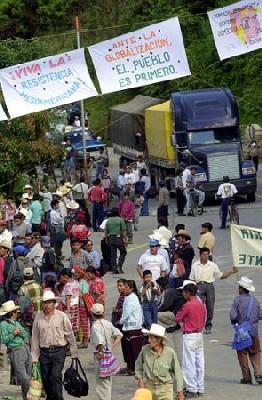 COLOTENANGO, Guatemala - Thousands of Indians blocked highways across Central America and Mexico on Saturday, protesting Columbus Day and celebrating the region's Indian heritage.
COLOTENANGO, Guatemala - Thousands of Indians blocked highways across Central America and Mexico on Saturday, protesting Columbus Day and celebrating the region's Indian heritage.
Organizers of marches in Guatemala had originally predicted that participants would close Guatemala's borders with Mexico, Honduras and El Salvador, but only a few crossings were blocked.
"We are investigating why there aren't the protests that we had planned, but we can say that 50 percent of what we expected is taking place," said Daniel Pascual, one of the coordinators of the demonstrations.
Police and soldiers were sent out across the region to prevent violence, but no major disturbances were reported.
In Guatemala, 1,000 protesters blocked a highway near Colotenango, 170 miles (280 kms) northeast of Guatemala City near the border with Mexico.
Indian farmers also put up barricades on four other northern highways in the nearby Peten region to protest the construction of a Mexican hydroelectric dam farther up the Usumacinta River. Opponents say it will flood Mayan archaeological sites.
Saturday's protests coincided with the anniversary of Christopher Columbus' discovery of America in 1492. Many Indian groups oppose Columbus Day celebrations, arguing that the Europeans' arrival marked the start of the Indians' fight to maintain their traditions and land.
"The 12th of October is a symbol of resistance for the Indian communities before the Spanish invasion," said Mario Godinez, another march organizer in Guatemala.
Across the border in Mexico, President Vicente Fox (news - web sites) praised the Indian marches, saying they were a "recovery of (the Indian groups') dignity, identity, culture, history."
"As a nation, Mexico has an enormous debt to the Indian villages and communities," he said.
In Mexico's southern Chiapas state, supporters of the Zapatista rebels closed off roads to a military base and blocked highways with ropes and dirty shirts.
"The dirty, sweaty shirts represent the dignity of the Indian villages," said march organizer Juan Lopez.
They urged the government to cancel its Plan Puebla-Panama, which calls for greater development in Central America and impoverished southern Mexico.
And they called on the Mexican government to comply with the Zapatista rebels' demands, including pulling all troops out of the tense region, freeing Zapatista sympathizers from jail, arresting paramilitary members and canceling plans to create a free trade region of the Americas.
Fox's efforts at reaching a peace agreement with the rebels dissolved in early 2001 when Congress watered down an Indian rights bill and the Zapatistas broke off contact with the government.
Thousands also marched through the streets of Mexico City, calling on the government to end widespread discrimination against the country's millions of Indians and provide them with better educations, jobs and living standards.
In Managua, Nicaragua, Indians protested free-trade agreements and the privatization of government utilities in front of the Inter-American Development Bank's offices.